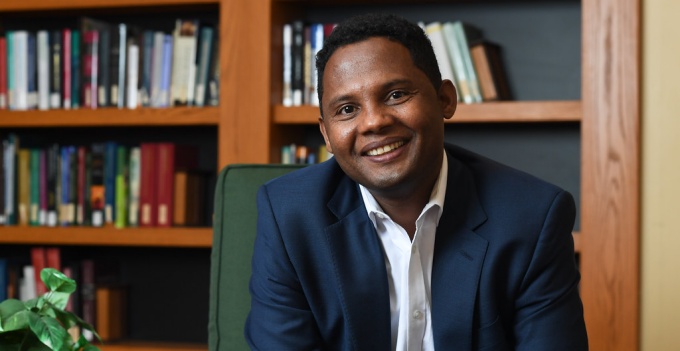
A global citizen lands in Buffalo
Associate Professor Mekonnen Firew Ayano has a broad teaching portfolio as he settles in at UB Law: He’ll teach courses in property, immigration and environmental law.
His scholarly investigations are just as wide-ranging. Ayano has researched and written on immigrants’ experiences in low-income housing in Washington, D.C.; land law in his native Ethiopia; and most recently, how lawyers function in the development relationship between China and Africa.
There’s a throughline to his work. He’s motivated, he says, by “the distributive outcome of certain legal rules” or how the law works to improve some people’s lives and fails to work for others.
Ayano comes to Buffalo from the University of Missouri School of Law, where he taught for two years as a visiting assistant professor. Before that, he completed a postdoctoral fellowship at Harvard University’s newly established Center for African Studies, examining law and development in African settings. He also taught briefly at Harvard Law, where he earned his SJD—Harvard Law’s most advanced degree—in 2016.
He was drawn to UB Law, he says, by its reputation as a leader in the Law & Society movement, which uses the tools and approaches of the social sciences to understand how the law works in society. “My research is in Law & Society, so I knew about Buffalo while I was a graduate student at Harvard,” Ayano says. “UB School of Law has been influential in this area.”
Ayano also brings with him extensive practice experience in transnational law. As legal counsel at the legal divisions of the World Bank, he worked in Washington for three years providing transactional legal services for international development projects and programs. Following that, he was counsel for a regional economic bloc, comprising 27 East African nations, working in Burundi and Kenya.
And just after completing his undergraduate studies at Addis Ababa University, he served on the trial bench of the High Court of Oromia, a vast and mostly rural and agrarian district of central Ethiopia. The appointment wasn’t all that unusual, he insists—university-educated lawyers are scarce in the country, and he was one of the few judges on the court with a legal education from a university.
It was while serving on the court, Ayano says, that he realized he might do more good as an academic. “Everyone wants to change the world and make everything perfect,” he says. “The ideas I had from law school and what I expected to happen on the bench, was really not right.” The fraught relationship between lenders and small farmers troubled him. Despite his place on the bench, sometimes he could do nothing to stop evictions that threatened families’ livelihood. “Maybe,” he decided, “there is a deeper problem that I should think about.”
All those experiences inform his teaching and so does his personal story as a global citizen. Teaching immigration law, for example, Ayano says, “I have been through so many immigrations. Students need to know that people move around and things are interconnected globally. I have that experience of being in different places at different times, and I can link that to the legal black-letter materials we are studying. They read the materials and read the cases, but they don’t necessarily know the practical aspects. I can show them the reality."